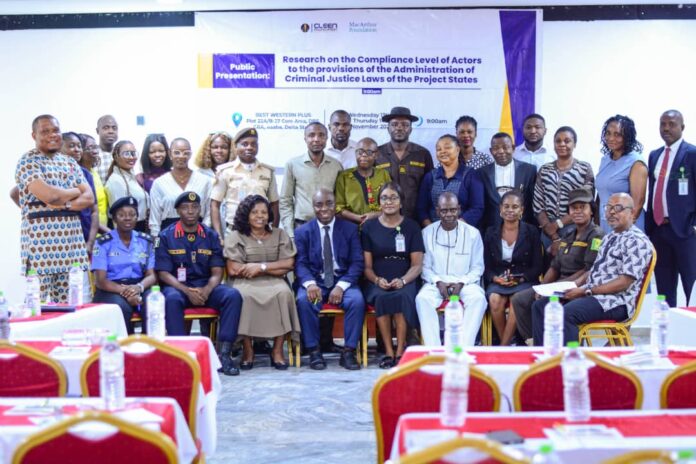By Valentine Utulu
The CLEEN Foundation, a Non-governmental organisation has charged stakeholders and state actors in the nation’s justice system to hasten compliance to the domestication of the administration of the criminal justice law.
Acting Executive Director of the Foundation, Mr..Peter Maduoma gave the charge on Wednesday at a 2-day advocacy workshop on increased budgetary allocation for effective monitoring and implementation of the ACJ law held in Asaba.
He said the workshop is crucial to the objectives of the ACJ law as it will seeks to evaluate research findings on compliance level of major stakeholders and actors to the provisions of the ACJ law.
Represented by Mr..Ebere Mbaegbu, programme officer of the Foundation, Maduoma disclosed that the workshop would also delve into an overview of state capacity to facilitate the effective implementation of ACJL regime in the country.
“This workshop would also consider the justice gap and how to close them through State Capacity in the area of good and adequate Budgeting.
“It would equally be looking at the critical role of strategic advocacy and communication as a tool for policy formulation and change.
“For us in CLEEN Foundation, it is important that all the deliberations in this two-day workshop will lead to great improvement in the work we all have been doing in the advancement of the ACJA/L across the nation
“The good news is that as at today the ACJ Act has been enacted as laws across the 36 states of the federation”, he said.
According to Maduoma, it is not yet “Uhuru” because the beauty of any law or legislation lies in the effective and efficient implementation of its content by the agencies saddled with such responsibility.
He posited that the ACJ law was made to achieve a society where peace and justice would reign supreme devoid of any form of oppression.
The acting executive director noted that with the avalanche of distinguished, highly knowledgeable, and experienced personalities taking part in the workshop, the Foundation is confident of success at the end of the workshop.
He lauded the support of the its donor partner, the MacArthur Foundation for funding the project, while assuring that CLEEN Foundation would deliver on the assignment in respect to the advancement of ACJ law in Nigeria.
In a goodwill remark, the Delta Attorney-General and Commissioner for Justice, Mr.Ekemejero Ohwovoriole (SAN) lauded the CLEEN Foundation for its commitment to the implementation of the ACJ law in Nigeria.
Represented by Mrs. Sylvia Dumudge, Assistant Chief State Counsel in the State Ministry of Justice, the commissioner said the ACJ law as a means of ensuring speedy and effective administration of justice cannot be overemphasized.
“The Delta State ACJ law was first enacted in 2016. However, in course of the implementation of the law, some lapses were observe thus necessitating the need for amendment of the law.
“Suggestions from critical stakeholders were received and collated, culminating in the holding of a stakeholder forum in May 2022.
“The proposed amendment law was forwarded to the House of Assembly for legislative processes and the new ACJ law came into force on December 22, 2022.
“The amended law aims at improving the criminal justice system in Delta State and ensuring that criminal cases are dealt with justly and in the shortest possible time”, Ohwovoriole said.
He stated that apart from front loading of cases, in order to enhance speedy trial of cases, virtually hearing and electronic transcribing of cases had been introduced under the ACJ law in the state.
According to him, the law has also introduced the non-custodial sentencing with a view to decongesting the correctional detention centres across the state.
The Attorney-General disclosed under the provision of the law, remand proceedings in respect of charges beyond the Magistrate court’s jurisdiction, has now been taken to the High courts.
“This is important because the Magistrate court does not have the courage to discharge or grant bail, where no probable offence is disclosed.
“Also, the ACJ law introduced series of innovations such as time lines for detention by police, rendering of legal advice, filing of information and period for trial of criminal cases.
“I believe that as your deliberate at the workshop, you will come up with more effective ways of improving on justice system delivery, particularly in the area of budgeting for ACJ”, he said.
In another remark, a member of the ACJ Monitoring Committee in Delta, Mr. Chucks Okpunor, commended CLEEN Foundation for what he described as a ‘wonderful job’ in its commitment to the advance of the ACJ law in Nigeria.
He said there is no other organisation that has achieve great height with respect to advocacy for domestication of the ACJ laws and reforms in Nigeria.
“As we strive to enhance the effectiveness and efficiency of our criminal justice system, we recognize the invaluable contributions of our partners, including Cleen Foundation and MacArthur Foundation.
“We at the ACJ monitoring committee remain committed to
ensuring timely, fair administration of justice and pomoting transparency and accountability in the system.
“We are also committed to supporting victims and witnesses and enhancing professionalism within law enforcement agencies”, Okpunor said.
According to him, the ACJ monitoring committee’s mandate is to monitor and evaluate the administration of criminal justice in the State and Nigeria at large and identify areas for improvement.
He expressed the committee’s appreciation of the tireless efforts of stakeholders, and partners, especially Cleen Foundation and MacArthur Foundation in enhancing justice delivery.



